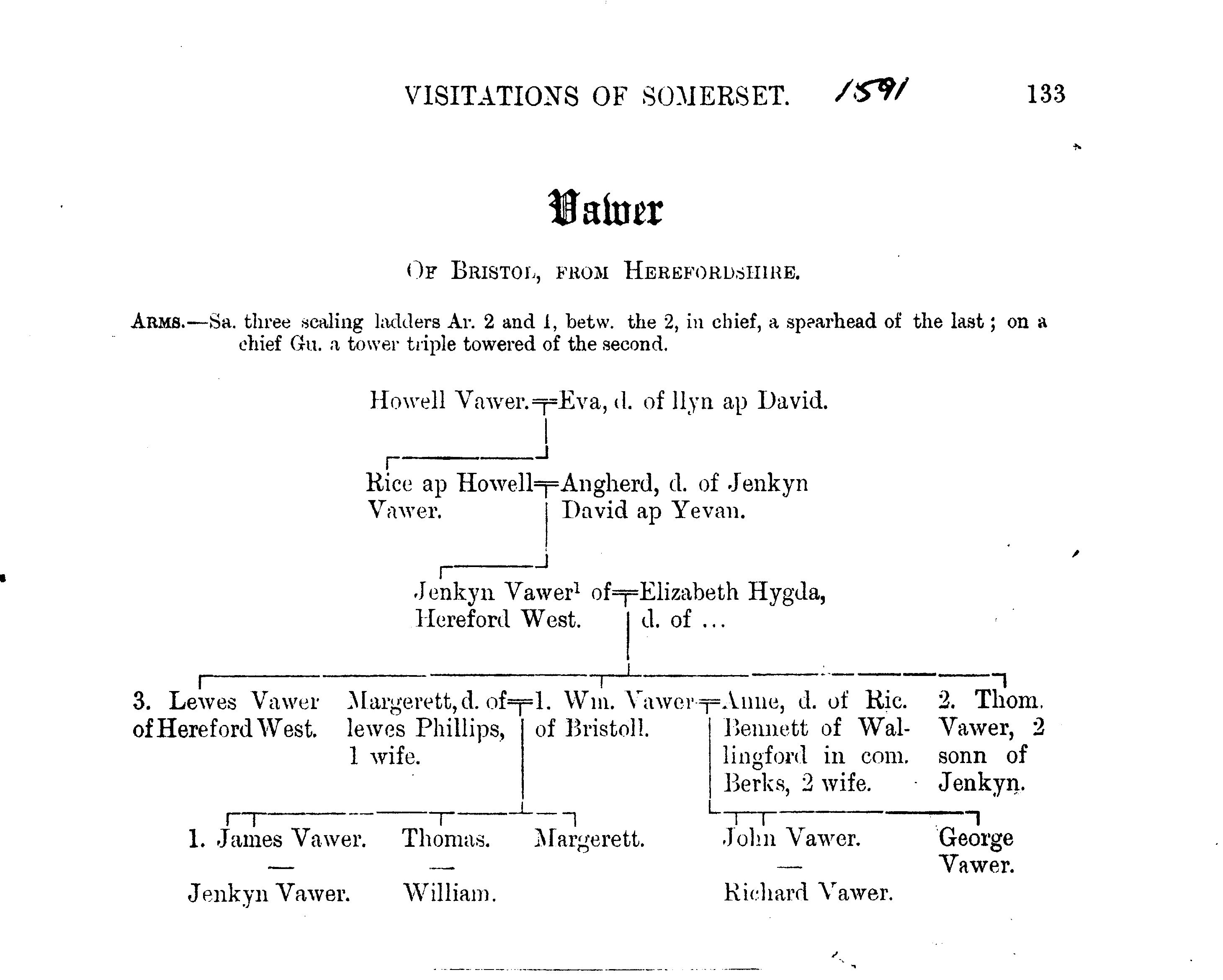|
William Vawer, Mayor of Bristol, and Merchant Venturer, was the 15th
generation, down the direct male line, from Cadivor ap Dynawal, but his coat of
arms comes directly from that of Dinawal and Cadivor (Cydifor), particularly
the latter's new shield.
William gave the following as his pedigree when he applied for a coat-
of-arms in 1591, when he was living at Birdcombe Court, Wraxall, near Nailsea.

For Hereford, read Haverfordwest (Hwlfford).
This is a compressed version of his pedigree - which is given in much more
detail in Sandra Oman's Gedcom file.
William was born in what is now Haverfordwest in Pembrokeshire. At the
time this was an inland port of major significance founded by Henry 1.
William's father, Jenkin, was a Shearman, i.e. a finisher and merchanter of
woollen cloth (West Wales Historical Records: The Annual Magazine of the
Historical Society of West Wales Published and by Printed by W. Spurrell and
son, 1923 Item notes: v.9 1919). Raw fleece is "Teased" initially to spread it
out, remove dirt and lumps, before "Carding". Carding further cleans and
disentangles the wool making it ready for the spinning process. At the carding
stage, different fibres may be blended, and colours mixed. This is a major
stage in woollen cloth manufacture. After carding the wool can be spun ready
for weaving.
It is not surprising, therefore, that Jenkin arranged for his son to become
apprenticed to a Cardmaker in Bristol. Bristol was a major and extremely
important port too, and moving between Haverfordwest and Bristol would have
been routine in the 16th Century and it is no surprise that William left home
to serve his apprenticeship there.
Once he had served his time he would become a respected craftsman, and begin
to make a good living. How much cardmaking he did we do not know, but it seems
however that he used the status to diversify somewhat, and took an interest in
Bristol politics. How much the standing of his ancestry had to do with this we
do not know, but he became an Alderman, was sheriff of Bristol with Ralph Hurt
in 1587, and in 1602 the Mayor of Bristol, and he obviously moved in some high
circles.
The trade through Bristol Docks was controlled by the Society of Merchant Venturers.
William became a member of this organisation, hence the suffix "Merchant" to
his name. His contribution to the work of the Society was significant, his
name cropping up in a number of documents. Significant correspondence includes
that between William and Sir Robert Cecil, Marquis (later Earl) of Salisbury
and a Secretary of State to Queen Elizabeth 1 concerning shipping of troops and
horses to Ireland, and shipping of correspondence for the Lord Deputy of
Ireland and the Lord President of Munster in 1601 during the Nine Years War (1594-1603)
William also became a trader, importing wine amongst other goods.
Jenkin, his father, was quite active in Haverfordwest having hands in a number of
property deals, which are on record at the record office there, as was William'
s brother, Thomas. Further details are in our historical
file on Vawers in Haverfordwest. William is also
recorded in association with a number of property deals in his home town.
William obviously kept close to his roots in Haverfordwest, and set up the "
Vawer's Charity". This charity still exists today. Some of these property
deals were directly related to his charity. Jean Woodward has visited
Haverfordwest Record Office and documented most if not all of these, and
transcripts are available for interested people using the Contact Us page.
|





